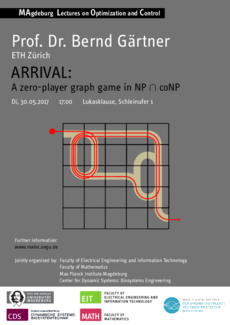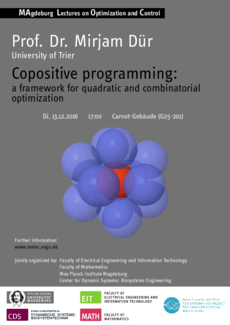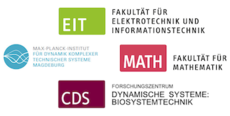Past Events
ARRIVAL: A zero-player graph game in NP ∩ coNP
Prof. Dr. Bernd Gärtner
ETH Zürich, Schweiz
Time & Place
The presentation on May 30, 2017 will be given in the Lukasklause (Schleinufer 1, 39104 Magdeburg) and starts at 5.00 p.m. (Historischer Raum).
Abstract
Suppose that a train is running along a railway network, starting from a designated origin, with the goal of reaching a designated destination. The network, however, is of a special nature: every time the train traverses a switch, the switch will change its position immediately afterwards. Hence, the next time the train traverses the same switch, the other direction will be taken, so that directions alternate with each traversal of the switch.
Given a network with origin and destination, what is the complexity of deciding whether the train, starting at the origin, will eventually reach the destination?
It is easy to see that this problem can be solved in exponential time, but we are not aware of any polynomial-time method. In this talk, I explain where the problem comes from and prove that is is in NP ∩ coNP; actually in UP ∩ coUP (problems with unique NP/coNP certificates).
This raises the question whether people have so far just failed to find a (simple) polynomial-time solution, or whether the complexity status is more subtle, as for some other well-known (two-player) graph games.
Joint work with Jérôme Dohrau, Hagar Mosaad, Manuel Kohler, Jiří Matoušek, Emo Welzl
Uncertainty quantification in inverse problems
Prof. Dr. Claudia Schillings
Universität Mannheim
Time & Place
The presentation on June 27, 2017 will be given in the Lukasklause (Schleinufer 1, 39104 Magdeburg) and starts at 5.00 p.m. (Großer Saal).
Abstract
Uncertainty quantification is an interesting, fast growing research area aiming at developing methods to address, characterize and minimize the impact of parameter, data and model uncertainty in complex systems. Applications of uncertainty quantification include all areas of engineering, environmental, physical and biological systems, e.g., groundwater flow problems, shape uncertainties in aerodynamic applications or nano-optics, biochemical networks and finance. The efficient treatment of uncertainties in mathematical models requires ideas and tools from various disciplines including numerical analysis, statistics, probability and computational science. In this talk, we will focus on the identification of parameters through observations of the response of the system - the inverse problem. The uncertainty in the solution of the inverse problem will be described via the Bayesian approach. We will discuss efficient methods to approximate the solution of the resulting high/ infinite dimensional systems.
Mirjam Dür
Copositive programming: a framework for quadratic and combinatorial optimization
Prof. Dr. Mirjam Dür
Department of Mathematics
University of Trier
Time & Place
The presentation on December 13, 2016 will be given in the Carnot-Gebäude G25 in Room 201 and starts at 5.00 p.m..
Abstract
A copositive optimization problem is a problem in matrix variables with a constraint which requires that the matrix be in the copositive cone. This means that its quadratic form takes nonnegative values over the nonnegative orthant. Many combinatorial problems like for example the maximum clique problem can be equivalently formulated as a copositive problem. Burer (2009) showed that also any nonconvex quadratic problem with linear constraints and binary variables can be reformulated as such a copositive problem. This is remarkable, since by this approach, a nonconvex problem is reformulated equivalently as a convex problem. The complexity of the original problem is entirely shifted into the cone constraint. We review recent progress in this area, concerning both theoretical results and numerical issues. In particular, we show how this approach can be used to deal with the stable set problem for infinite graphs, an application of which is the famous kissing number problem.
The lecture is part of the 10th CDS anniversary.
Manfred Morari
Computation and uncertainty — The past, present and future of control
Prof. Dr. Manfred Morari
Distinguished Faculty Fellow
University of Pennsylvania
Time & Place
The presentation on October 18, 2016 will be given in the Lukasklause (Schleinufer 1, 39104 Magdeburg) and starts at 5.00 p.m. (Historischer Raum).
Abstract
Reflecting on our work over the last 40 years I found that it was dominated by two themes: computation and uncertainty. I will describe how the rapidly increasing computational resources have affected our approaches to deal with uncertainty in feedback control. The talk will be illustrated by examples from process control and other application areas like automotive and power systems.
Bio
Manfred Morari was head of the Department of Information Technology and Electrical Engineering at ETH Zurich from 2009 to 2012 and head of the Automatic Control Laboratory from 1994 to 2008. Before that he was the McCollum-Corcoran Professor of Chemical Engineering and Executive Officer for Control and Dynamical Systems at the California Institute of Technology. From 1977 to 1983 he was on the faculty of the University of Wisconsin. He obtained the diploma from ETH Zurich and the Ph.D. from the University of Minnesota, both in chemical engineering. His interests are in constrained and robust control. Morari’s research is internationally recognized. The analysis techniques and software developed in his group are used in universities and industry throughout the world. He has received numerous awards, including the Eckman Award, Ragazzini Award and Bellman Control Heritage Award from the American Automatic Control Council; the Colburn Award, Professional Progress Award and CAST Division Award from the American Institute of Chemical Engineers; the Control Systems Technical Field Award and the Bode Lecture Prize from IEEE. He is a Fellow of IEEE, AIChE and IFAC. In 1993 he was elected to the U.S. National Academy of Engineering and to the UK Royal Academy of Engineering in 2015. He served on the technical advisory boards of several major corporations.
Britta Peis
Matchings and Matroids in Algorithmic Game Theory
Prof. Dr. Britta Peis
RWTH Aachen University
Chair of Management Science
Time & Place
The presentation on October 25, 2016 will be given in the Lukasklause (Schleinufer 1, 39104 Magdeburg) and starts at 5.00 p.m. (Historischer Raum).
Abstract
Throughout the talk we will see that the theory of combinatorial optimization turns out to be extremely helpful when it comes to analyzing game-theoretic models. We focus on the important role of structures and algorithms known from matching-and matroid theory for network bargaining games and congestion games. For example, we will see that congestion games are immune to Braess' paradox if (and only if) each player's strategy space forms the base set of a matroid.
Zlatko Drmac
Magdeburg Lectures on Optimization and Control
Prof. Dr. Zlatko Drmac
University of Zagreb
Accurate linear algebra in computational
methods for system and control theory
Tuesday, 05.07.2016 17:00
Lukasklause, Schleinufer 1
Jointly organized by: Faculty of Electrical Engineering and Information Technology, Faculty of Mathematics, Max Planck Institute Magdeburg Center for Dynamic Systems: Biosystems Engineering
Alexander Mitsos
Global Optimization of Unconventional Formulations for Sustainable Energy Systems
Prof. Dr. Alexander Mitsos
RWTH Aachen University
Time & Place
The presentation on May 3, 2016 will be given at the Lukasklause, Schleinufer 1, Magdeburg and starts at 5.00 p.m.
Abstract
The presentation gives an overview of the group's recent and current work on energy systems and describes some highlights in more detail. The focus is on the optimal design of renewable energy systems, in particular concentrated solar thermal, geothermal and biomass conversion. We discuss optimal layout, optimal design and optimal operation over time scales (hourly, daily, seasonal). We also discuss hybrid systems consisting of more than one energy source with the goal of synergetically combining sources with different characteristics. These systems have characteristics that are different from conventional energy systems, namely the combination of turbomachinery and chemical processes, pronounced uncertainty and time-variability. As a result, these systems need to be addressed using systematic methods from process systems engineering and at the same time can be utilized to identify and overcome limits in these methodologies. In the last decade, algorithms for deterministic global optimization of mixed-integer nonlinear programs (MINLP) have undergone major changes rendering the solution of challenging optimization problems possible. We utilize these advantages to optimize several renewable energy systems using state-of-the-art codes. However, we also demonstrate that the optimization of several systems is not possible using these codes due to mainly two reasons, namely scaling of computational complexity with size of problems and the fact that natural formulations for many problems do not follow the traditional MINLP. To address these problems we develop theory for the scaling of algorithms and algorithms for unconventional formulations and utilize them for energy systems. In particular we discuss embedded/hierarchical programs (bilevel, semi-infinite, differential-algebraic systems with optimization embedded) and how these problems can be solved. We finally briefly discuss open challenges in optimization theory and algorithms and in energy systems.
Short CV
Alexander Mitsos is a Full Professor (W3) in RWTH Aachen University, and the Director of the Laboratory for Process Systems Engineering (AVT.SVT), comprising 40 research and administrative staff. Mitsos received his Dipl-Ing from University of Karlsruhe in 1999 and his Ph.D. from MIT in 2006, both in Chemical Engineering. Prior appointments include military service, free-lance engineering, involvement in a start-up company, a junior research group leader position in the Aachen Institute of Computational Engineering Science and the Rockwell International Assistant Professorship at MIT. Mitsos has over 80 peer-reviewed publications and has received a number of awards. His research focuses on optimization of energy and chemical systems and development of enabling numerical algorithms.
Anton Schiela
Concepts of Function Space Oriented Optimization
Prof. Dr. Anton Schiela
University of Bayreuth
Time & Place
The presentation on January 12, 2016 will be given at the Lukasklause, Schleinufer 1, Magdeburg and starts at 5.00 p.m.
Abstract
Many large scale nonlinear optimization problems are discretizations of
optimization problems in function space and thus, we expect that additional
functional analytic structure should be present. The goal of function space
oriented optimization is to exploit this structure. This may comprise the
efficient computation of steps by iterative solvers, problem suited
globalization strategies, or the use of adaptive mesh refinement inside
an optimization method.
In this talk we will give an overview of a couple of ideas, and explain at
concrete examples how they can be implemented.
Short CV
Anton Shiela is a professor for applied mathematics at the University of Bayreuth.
His fields of research are optimization with PDEs, in particular the
development of algorithms for the solution of optimization problems in
function space.
Before moving to Bayreuth in 2014, he was an associate professor
at Technische Universitaet Hamburg-Harburg (2013-2014) and
Matheon junior reseach group leader at TU Berlin (2012-2013).
He got his PhD in 2007 at Zuse Institute Berlin, where he worked
as a reasearch assistant (2002-2012).
Samuel Fiorini
No Small Linear Program Approximates Vertex Cover within a Factor 2-ε
Prof. Dr. Samuel Fiorini
Université Libre de Bruxelles
Time & Place
The presentation on December 8, 2015 will be given at the Lukasklause, Schleinufer 1, Magdeburg and starts at 5.00 p.m.
Abstract
The vertex cover problem is one of the most important and intensively studied combinatorial optimization problems. Khot and Regev (2003) proved that the problem is NP-hard to approximate within a factor 2-ε, assuming Khot's famous Unique Games Conjecture (UGC). This is tight because the problem has an easy 2-approximation algorithm.
We prove the following unconditional result about linear programming (LP) relaxations of the problem: every LP relaxation that approximates vertex cover within a factor 2-ε has super-polynomially many inequalities.
Greg Blekherman
Nonnegative Polynomials and Sum of Squares
Prof. Greg Blekherman, Ph.D.
Georgia Tech
Time & Place
The presentation on June 30, 2015 will be given in the Otto-von-Guericke-University Magdeburg G03-214 and starts at 5.00 p.m.
Abstract
A polynomial with real coefficients is nonnegative if it takes only nonnegative values. For example, any sum of squares is obviously nonnegative. The study of the relationship between nonnegative polynomials and sums of squares is a classical area in real algebraic geometry. It also has many applications, for instance in optimization and control theory, where sums of squares can be used for construction of Lyapunov functions, and understanding the size of semidefinite lifts of combinatorial optimization polytopes. After reviewing the history of the problem I will explain how this topic is inextricably linked to classical topics in complex algebraic geometry (varieties of minimal degree, dimension of secant varieties). Surprisingly these connections come via convex geometry. The talk is based on joint work with Sadik Iliman, Martina Kubitzke, Greg Smith and Mauricio Velasco.















